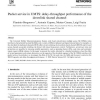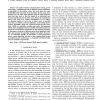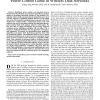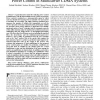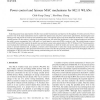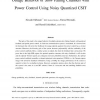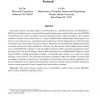99
Voted
WINET
2002
15 years 11 days ago
2002
We present a game-theoretic treatment of distributed power control in CDMA wireless systems. We make use of the conceptual framework of noncooperative game theory to obtain a distr...
CN
2002
15 years 17 days ago
2002
The Universal Mobile Telecommunications System, wide band code-division multiple access (W-CDMA) radio interface is characterized by great
TWC
2008
15 years 19 days ago
2008
In modern wireless communication systems, power control plays a fundamental role for efficient resource utilization, in particular in the systems where the users share the same ban...
104
click to vote
TON
2008
15 years 19 days ago
2008
Distributed power control is an important issue in wireless networks. Recently, noncooperative game theory has been applied to investigate interesting solutions to this problem. Th...
107
Voted
JSAC
2006
15 years 21 days ago
2006
A game-theoretic model for studying power control in multicarrier code-division multiple-access systems is proposed. Power control is modeled as a noncooperative game in which each...
100
Voted
COMCOM
2007
15 years 22 days ago
2007
Exploiting spatial reuse opportunities will allow more parallel transmissions and improve the throughput of wireless networks. Power control is one of the major mechanisms used to...
113
Voted
CORR
2006
Springer
15 years 23 days ago
2006
Springer
Abstract--In wireless networks, important network functionalities such as power control, rate allocation, routing, and congestion control must be optimized in a coherent and integr...
118
Voted
CORR
2008
Springer
15 years 25 days ago
2008
Springer
The topic of this study is the outage behavior of multiple-antenna slow fading channels with quantized feedback and partial power control. A fixed-rate communication system is con...
CORR
2010
Springer
15 years 25 days ago
2010
Springer
Decentralized multiple access channels where each transmitter wants to selfishly maximize his transmission energyefficiency are considered. Transmitters are assumed to choose freel...
133
Voted
AHSWN
2008
15 years 26 days ago
2008
This paper discusses the ideal shapes of control frames (i.e., RTS/CTS frames) in the IEEE 802.11 MAC layer for efficient power control and directional beam forming in mobile ad h...

